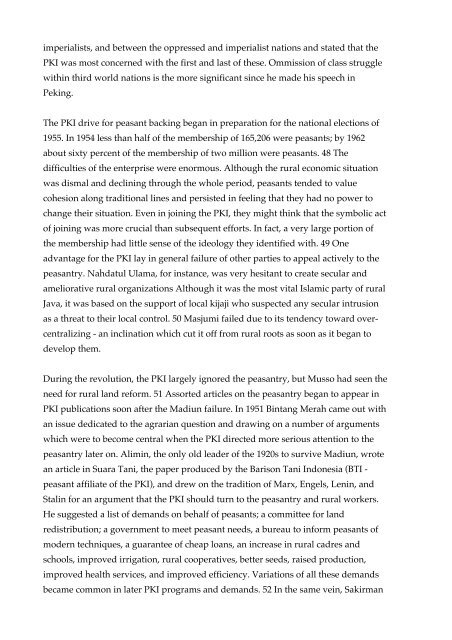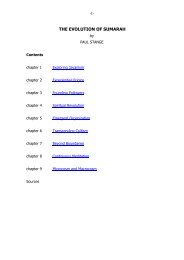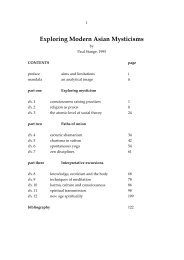Javanese Mystical and Marxist Dialectics - Paul Stange
Javanese Mystical and Marxist Dialectics - Paul Stange
Javanese Mystical and Marxist Dialectics - Paul Stange
You also want an ePaper? Increase the reach of your titles
YUMPU automatically turns print PDFs into web optimized ePapers that Google loves.
imperialists, <strong>and</strong> between the oppressed <strong>and</strong> imperialist nations <strong>and</strong> stated that thePKI was most concerned with the first <strong>and</strong> last of these. Ommission of class strugglewithin third world nations is the more significant since he made his speech inPeking.The PKI drive for peasant backing began in preparation for the national elections of1955. In 1954 less than half of the membership of 165,206 were peasants; by 1962about sixty percent of the membership of two million were peasants. 48 Thedifficulties of the enterprise were enormous. Although the rural economic situationwas dismal <strong>and</strong> declining through the whole period, peasants tended to valuecohesion along traditional lines <strong>and</strong> persisted in feeling that they had no power tochange their situation. Even in joining the PKI, they might think that the symbolic actof joining was more crucial than subsequent efforts. In fact, a very large portion ofthe membership had little sense of the ideology they identified with. 49 Oneadvantage for the PKI lay in general failure of other parties to appeal actively to thepeasantry. Nahdatul Ulama, for instance, was very hesitant to create secular <strong>and</strong>ameliorative rural organizations Although it was the most vital Islamic party of ruralJava, it was based on the support of local kijaji who suspected any secular intrusionas a threat to their local control. 50 Masjumi failed due to its tendency toward overcentralizing- an inclination which cut it off from rural roots as soon as it began todevelop them.During the revolution, the PKI largely ignored the peasantry, but Musso had seen theneed for rural l<strong>and</strong> reform. 51 Assorted articles on the peasantry began to appear inPKI publications soon after the Madiun failure. In 1951 Bintang Merah came out withan issue dedicated to the agrarian question <strong>and</strong> drawing on a number of argumentswhich were to become central when the PKI directed more serious attention to thepeasantry later on. Alimin, the only old leader of the 1920s to survive Madiun, wrotean article in Suara Tani, the paper produced by the Barison Tani Indonesia (BTI -peasant affiliate of the PKI), <strong>and</strong> drew on the tradition of Marx, Engels, Lenin, <strong>and</strong>Stalin for an argument that the PKI should turn to the peasantry <strong>and</strong> rural workers.He suggested a list of dem<strong>and</strong>s on behalf of peasants; a committee for l<strong>and</strong>redistribution; a government to meet peasant needs, a bureau to inform peasants ofmodern techniques, a guarantee of cheap loans, an increase in rural cadres <strong>and</strong>schools, improved irrigation, rural cooperatives, better seeds, raised production,improved health services, <strong>and</strong> improved efficiency. Variations of all these dem<strong>and</strong>sbecame common in later PKI programs <strong>and</strong> dem<strong>and</strong>s. 52 In the same vein, Sakirman




